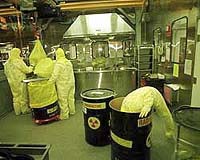 |
Kiev (AFP) Aug 12, 2010 It was shortly after one a.m on April 26, 1986 when the number-four reactor at the Chernobyl complex was shattered by massive blasts, releasing radiation and causing the world's worst civilian nuclear disaster. The explosion at the power station in Ukraine, which was then part of the Soviet Union, was to make the name of Chernobyl practically synonymous with the dangers of atomic energy. UKraine has been hit like neighbouring Russia by an unprecedented heatwave and a Ukrainian official said on Thursday a two hectare peat bog fire is burning 60 kilometres south of Chernobyl, but the situation poses no danger. Although only two people were killed in the actual 1986 explosions, which occurred during a badly-supervised test operation, the UN atomic agency says that 28 of the rescue workers who were rushed in afterwards, often without adequate protection, died of radiation sickness in the first three months. According to Ukrainian official figures, more than 25,000 people known as "liquidators" from then-Soviet Ukraine, Russia and Belarus have died since taking part in the bid to limit radioactive fallout after the catastrophe. Officially, in Ukraine alone, 2.3 million people are considered to have suffered following the disaster. The disaster had far wider repercussions, however, as the radioactive cloud projected into the atmosphere was carried by winds across large swathes of Europe to the north and west, notably affecting Belarus, western Russia, Scandinavia and much of central and western Europe. In the immediate vicinity of the plant, the slowness of the Soviet authorities to acknowledge the importance of the accident, and to begin evacuating residents, made the situation worse. It was only two days after the blast, when Sweden reported abnormally high levels of radiation in its atmosphere, that the story became front-page news in the West. While the Chernobyl power plant was finally closed in 2000, the dead reactor is still a threat because the concrete cover hastily laid over some 200 tonnes of spilled radioactive material is cracking and will not be replaced until 2012.
Share This Article With Planet Earth
Related Links Nuclear Power News - Nuclear Science, Nuclear Technology Powering The World in the 21st Century at Energy-Daily.com
 Federal Investigation Of Texas' Radioactive Waste Dump Urged
Federal Investigation Of Texas' Radioactive Waste Dump UrgedAustin TX (SPX) Aug 12, 2010 Environmental groups have asked the U.S. Nuclear Regulatory Commission (NRC) and the U.S. Environmental Protection Agency (EPA) to investigate the radioactive waste storage and disposal programs administered by the Texas Commission on Environmental Quality (TCEQ) for the West Texas radioactive waste site owned by Waste Control Specialists (WCS). The groups say the TCEQ has failed to protec ... read more |
|
| The content herein, unless otherwise known to be public domain, are Copyright 1995-2010 - SpaceDaily. AFP and UPI Wire Stories are copyright Agence France-Presse and United Press International. ESA Portal Reports are copyright European Space Agency. All NASA sourced material is public domain. Additional copyrights may apply in whole or part to other bona fide parties. Advertising does not imply endorsement,agreement or approval of any opinions, statements or information provided by SpaceDaily on any Web page published or hosted by SpaceDaily. Privacy Statement |